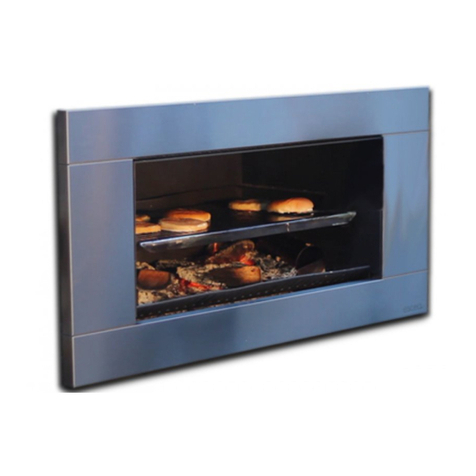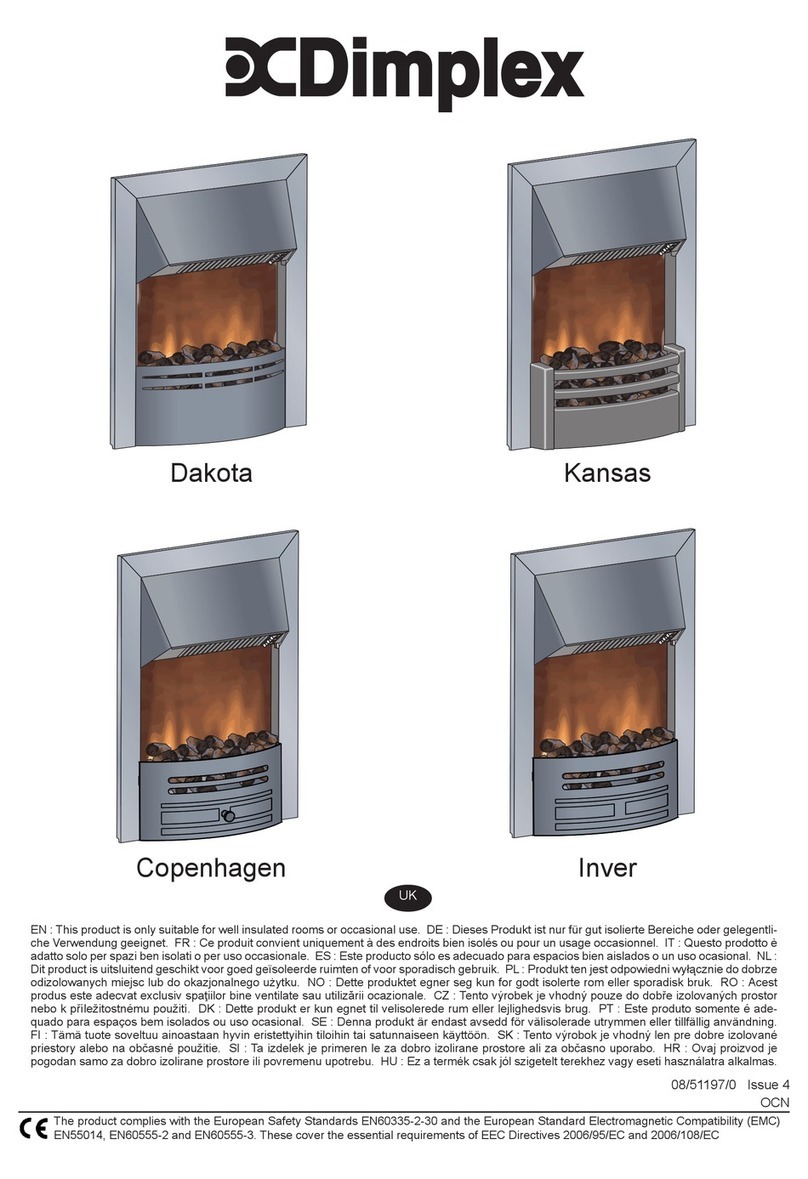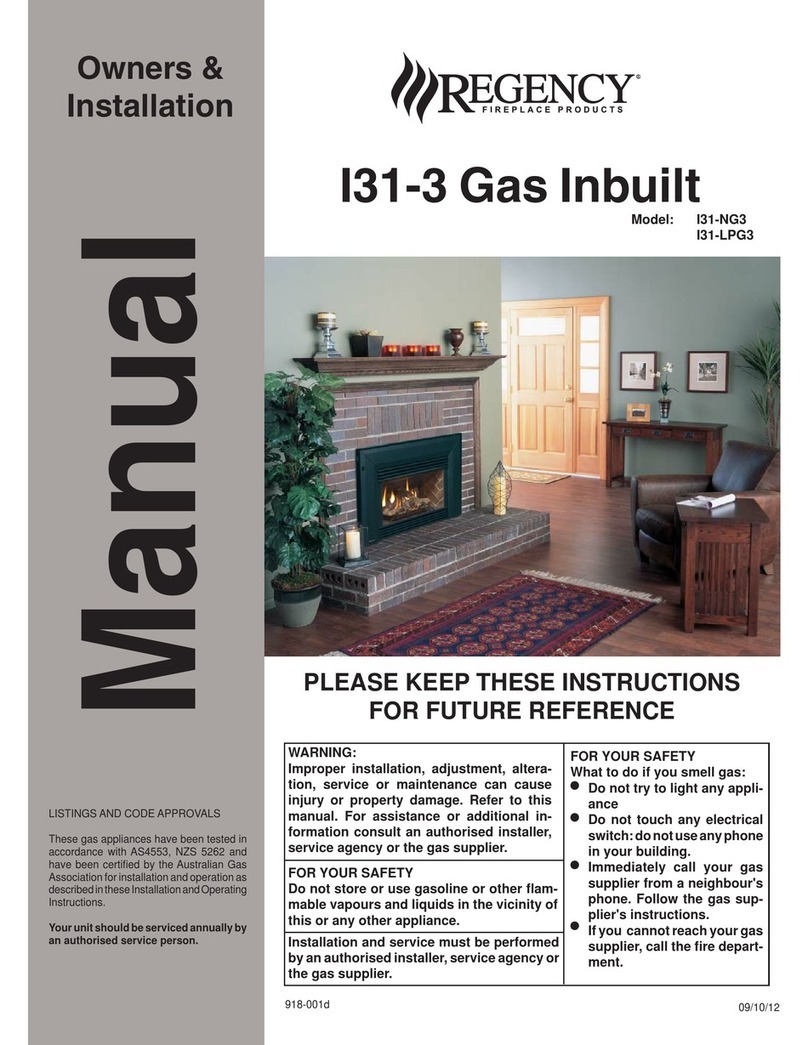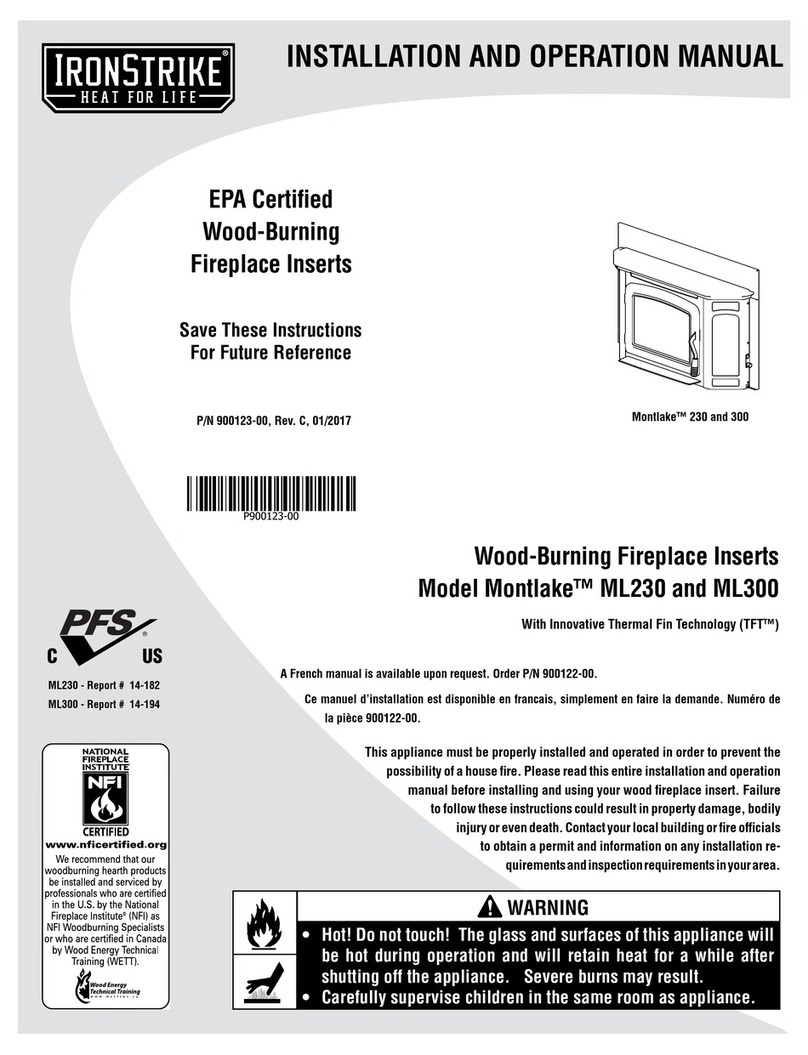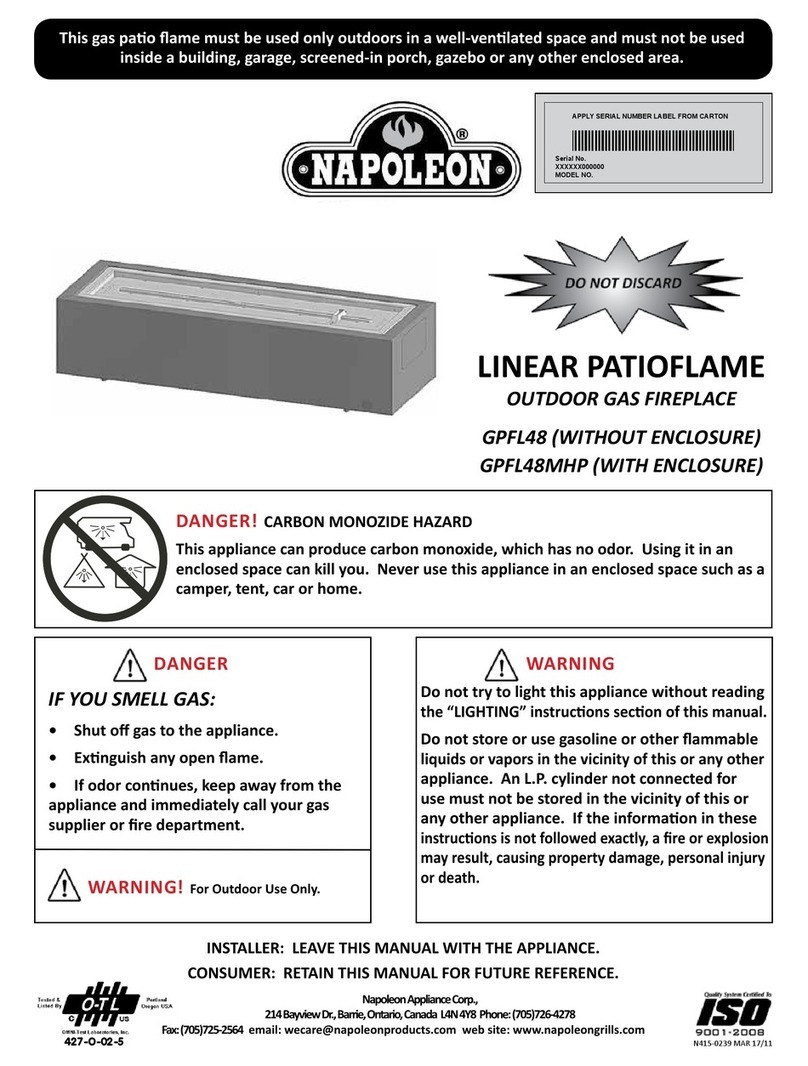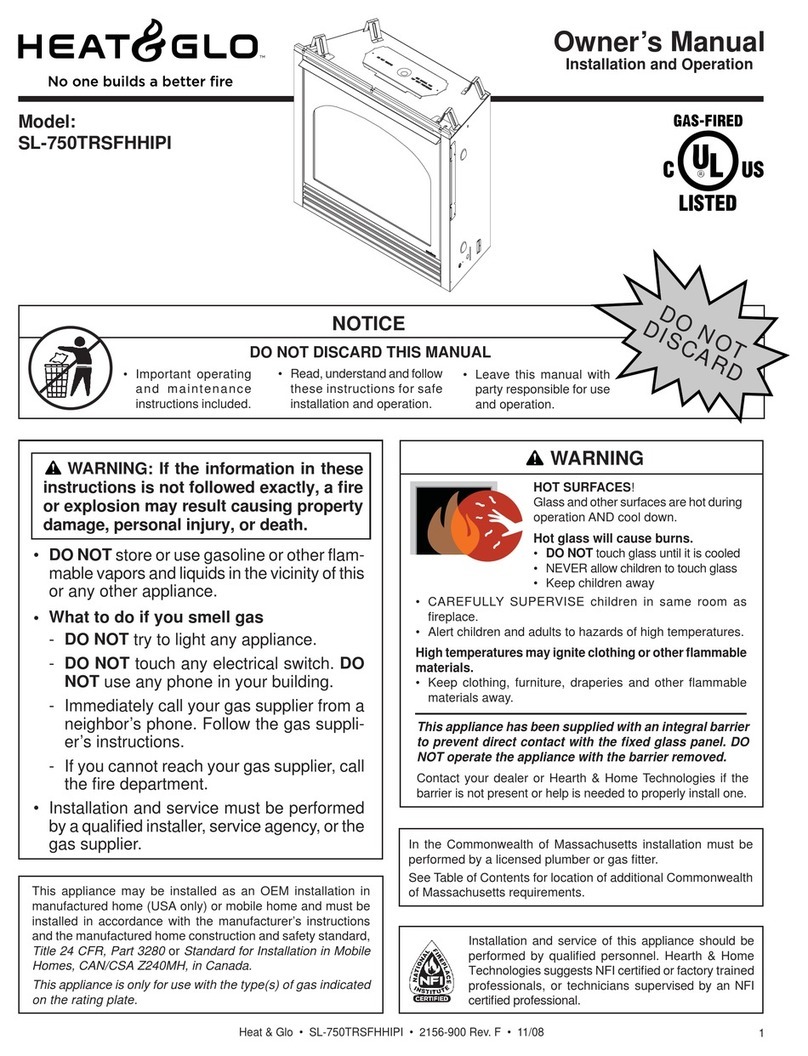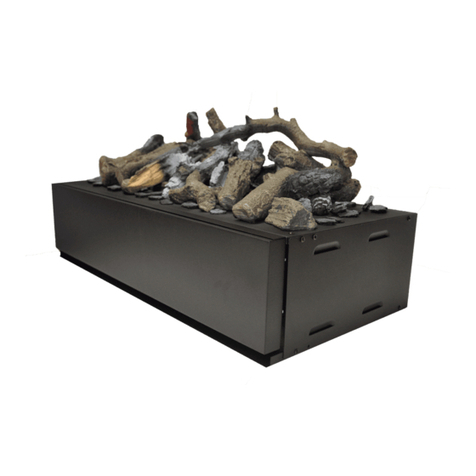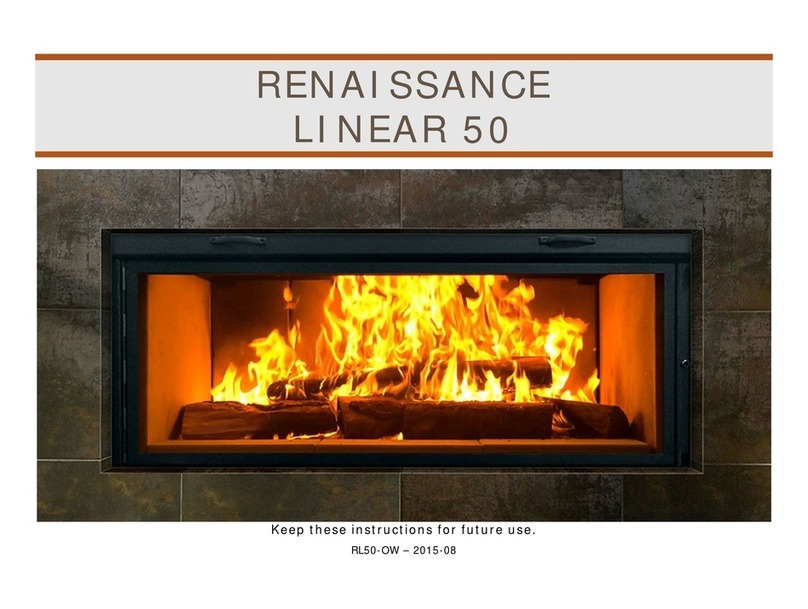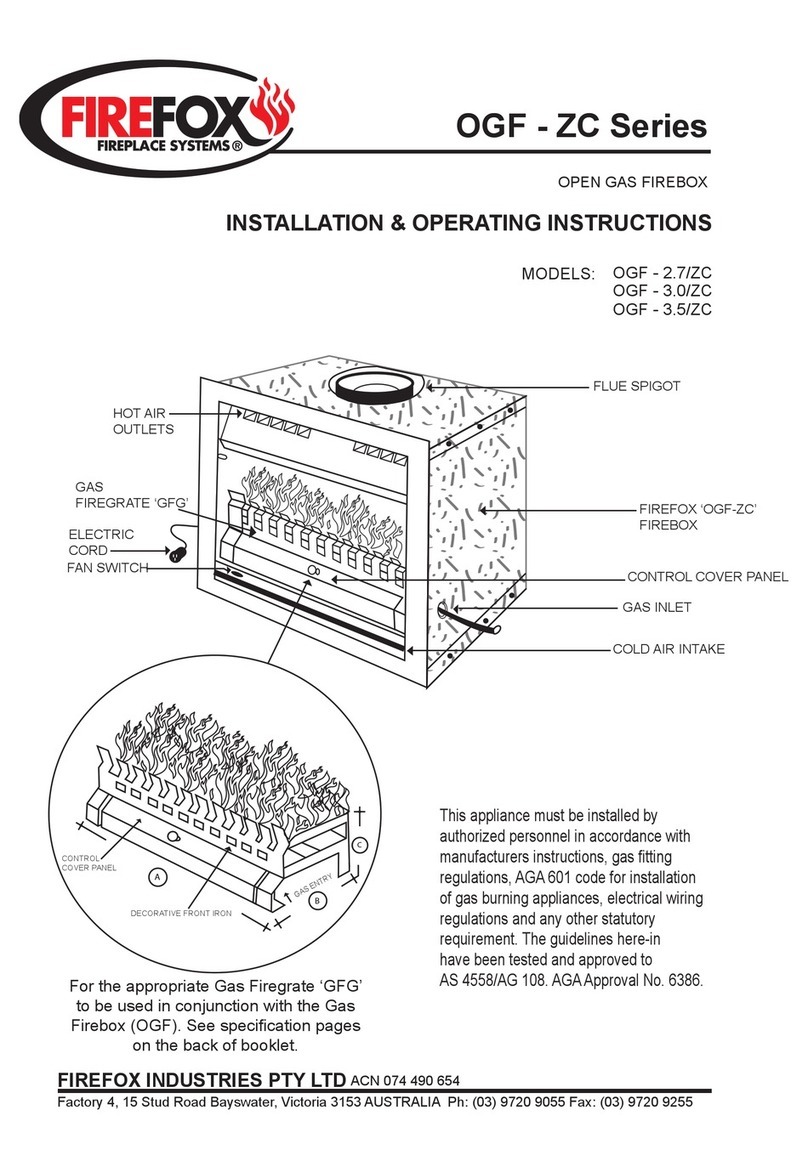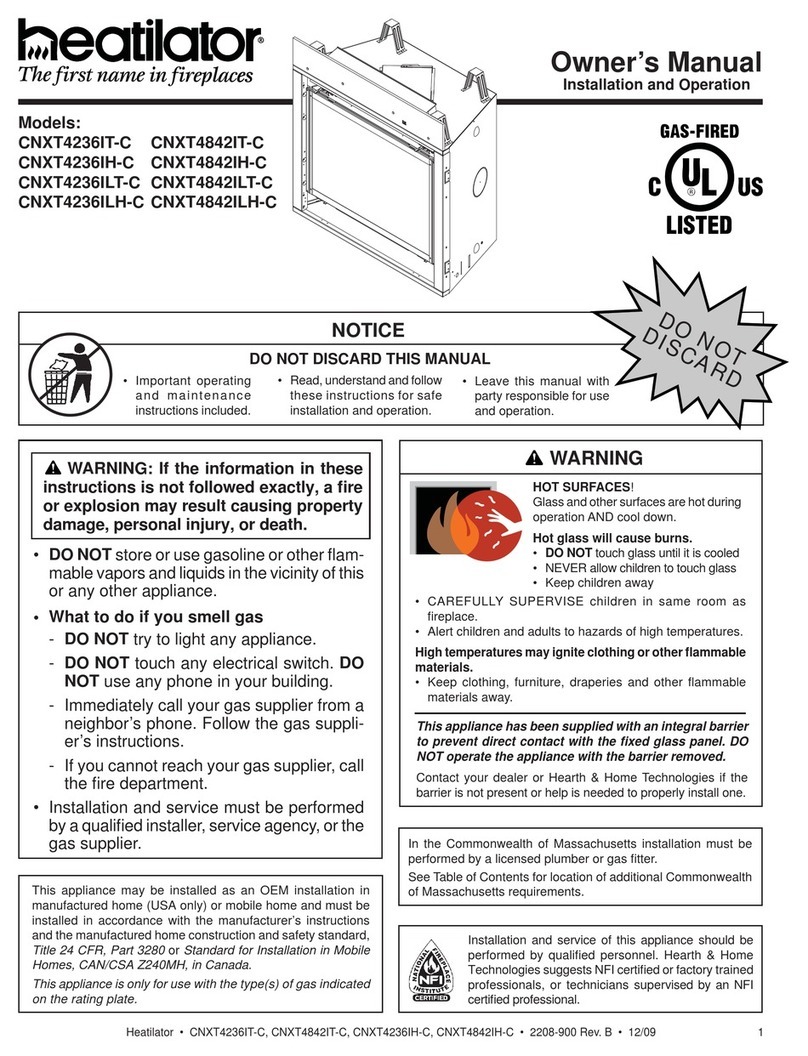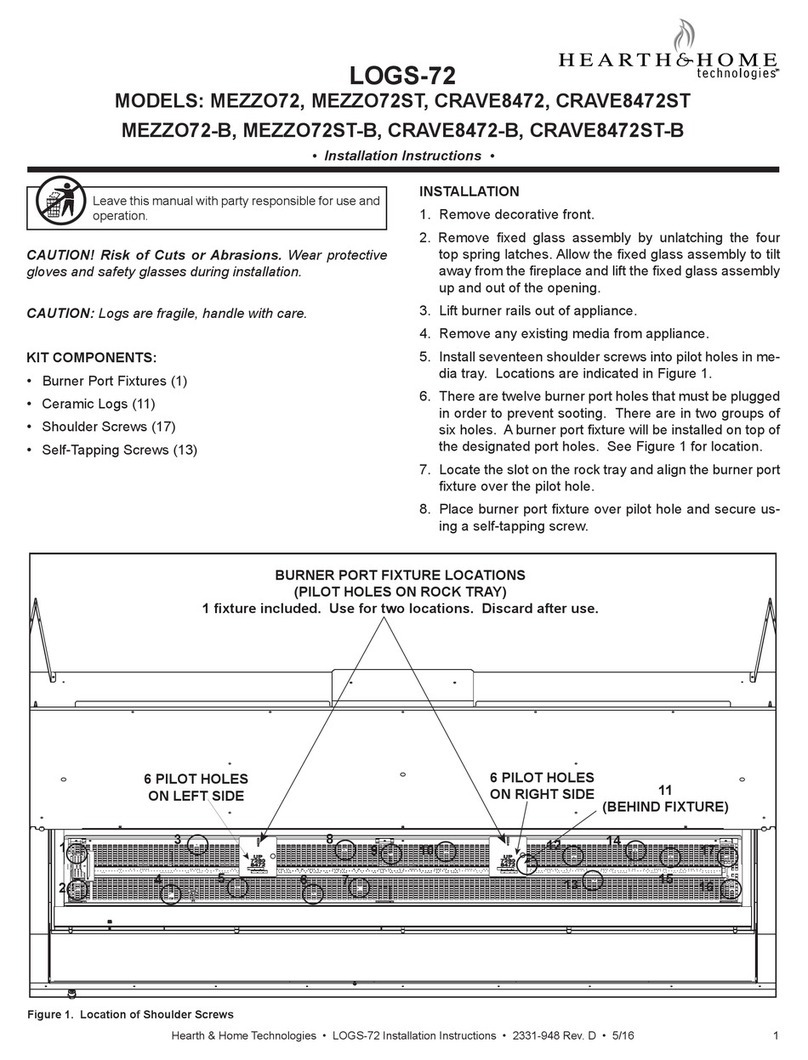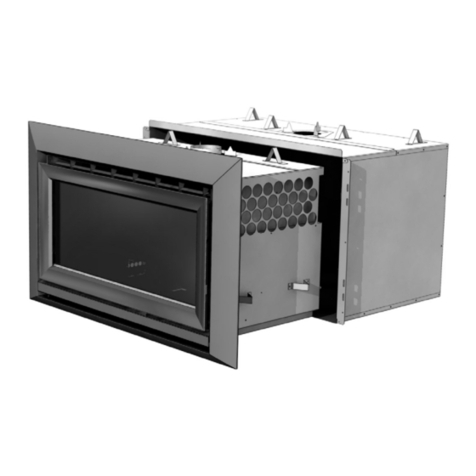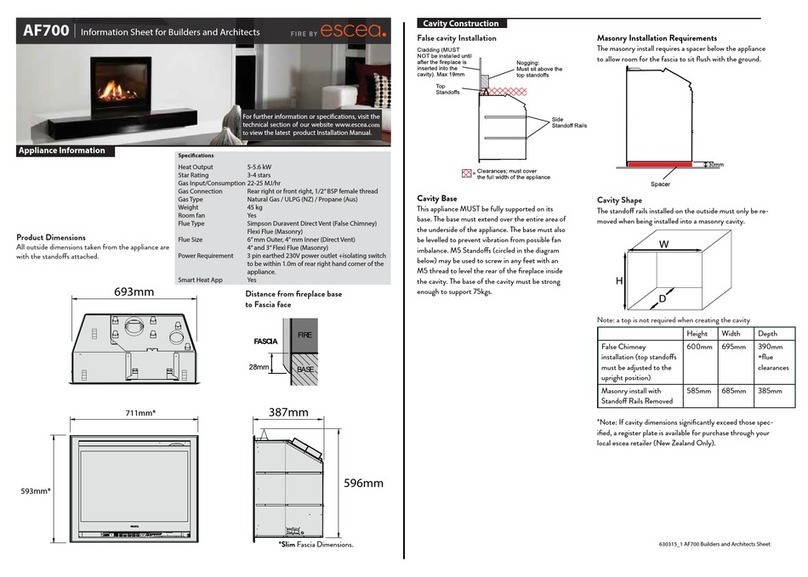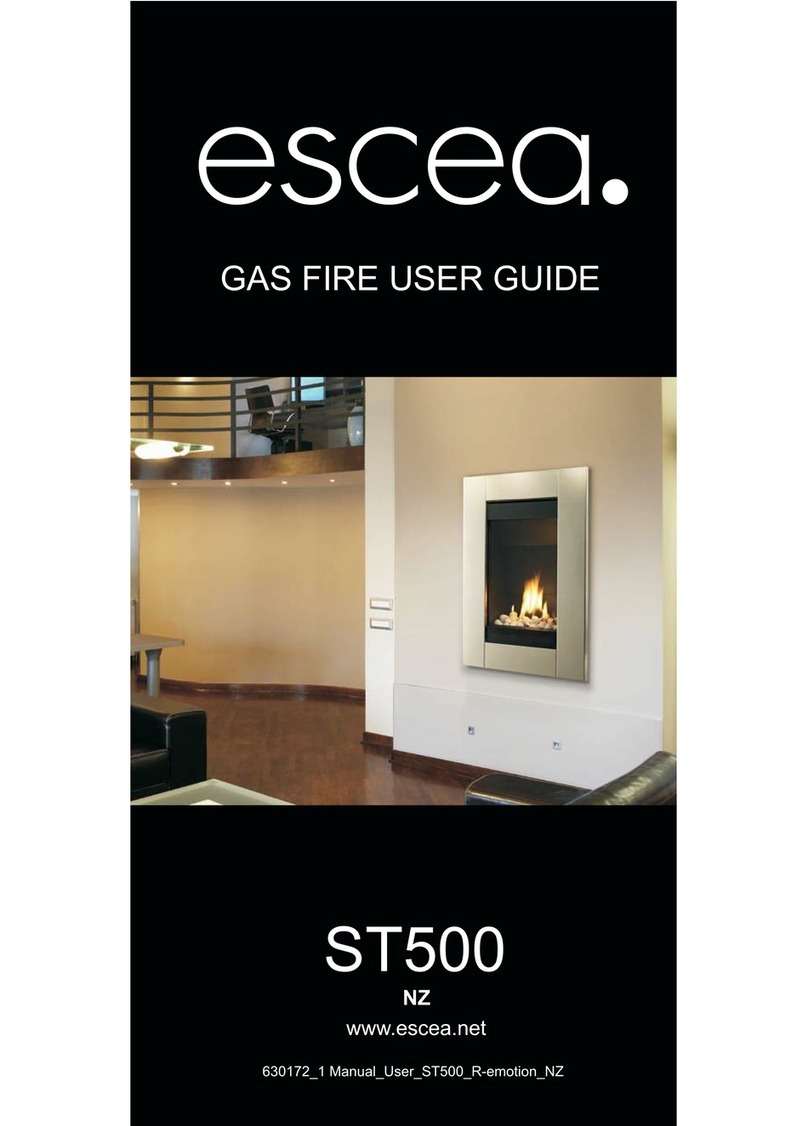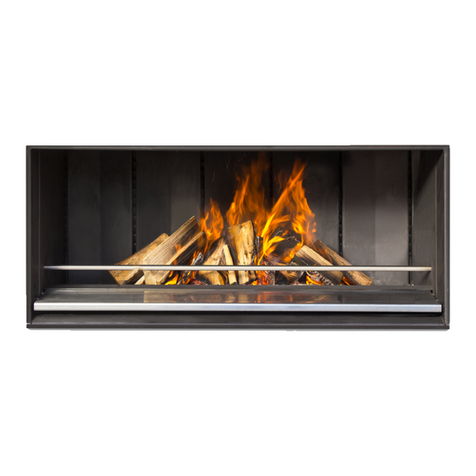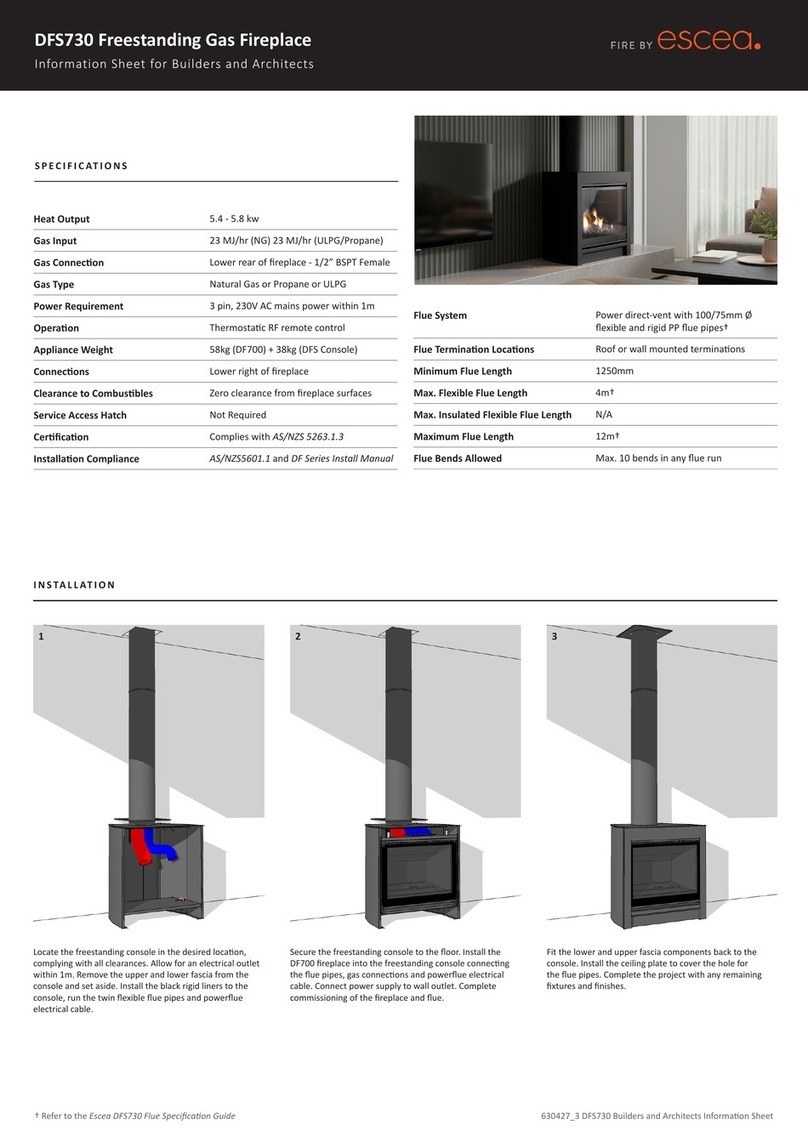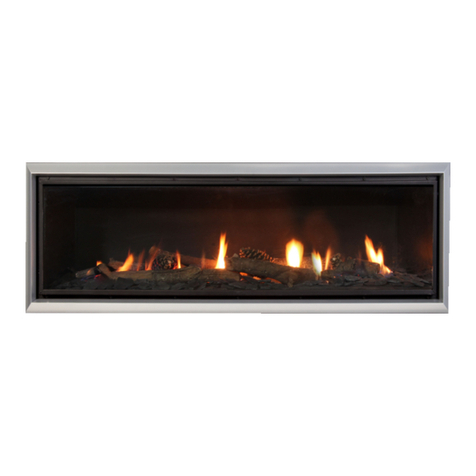
10 11
• This fireplace must be installed and serviced by
your dealer or a qualified service technician.
Other than cleaning the outer surface of
the glass, there are no user-serviceable
components.
• Keep the area around the fireplace clean
and free of debris. This fireplace requires
an unimpeded flow of air to circulate warm
air. Do not place objects on or around the
fireplace that may restrict air flow.
• Keep the area around the fireplace free of
combustible materials - including drapery,
upholstered furniture, paper, boxes, and
clothing. Never hang stockings or cards above
the fireplace.
• Never operate the fireplace with the glass front
removed or damaged. Any part removed for
cleaning or servicing must be replaced prior to
operating the fireplace.
• The fireplace gets hot during operation and
may remain hot for an hour after use. When
operated by thermostat, the fireplace will turn
on and o automatically.
• This fireplace may become hot enough to
burn skin and ignite clothing after prolonged
contact. To prevent injury, alert people in your
home - especially children - to the hazards of
high surface temperatures and warn them to
stay away from the fireplace.
• Supervise children whenever the fireplace
is hot. Young children and others may be
susceptible to accidental contract burns.
Have your dealer install a physical barrier if
there are at-risk individuals in your home. To
restrict access to a fireplace or stove, install an
adjustable safety gate to keep toddlers, young
children, and other at-risk individuals out of
the room and away from hot surfaces.
• The vent cap, located on the outside of your
home, will also become very hot. Alert
everyone, adults and children, to stay
clear and avoid touching the vent cap.
Keep the area around the vent cap clear of
combustibles, including shrubs and trees.
• Do not use this fireplace if any part has been
underwater. Have a qualified technician
inspect the fireplace and replace any part that
has been underwater. In the event of a natural
disaster (tornado, earthquake, fire, etc.) have
a qualified technician inspect the fireplace
for damage or potential gas leaks. Repair or
replace any damaged components before
operating this fireplace.
• Never burn solid fuels such as wood, coal, paper
or cardboard in this fireplace.
A FOR THE HOMEOWNER
A SAFETY INFORMATION FOR USERS OF PROPANE GAS
Propane is a flammable gas which can cause fires and explosions.
In its natural state, propane is odorless and colorless. You may
not know all the following safety precautions which can protect
both you and your family from an accident. Read them carefully
now, then review them point by point with the members of your
household. Someday when there may not be a minute to lose;
everyone’s safety will depend on knowing exactly what to do. If,
after reading the following information, you feel you still need
more information, please contact your gas supplier.
PROPANE GAS WARNING ODOR
DANGER
If a gas leak happens, you should be able to smell the gas because
of the odorant put in the Propane Gas. That’s your signal to go
into immediate action!
• Do not operate electric switches, light matches, or use your
phone. Do not do anything that could ignite the gas.
• IMMEDIATELY get everyone out of the building, vehicle,
trailer, or area.
• Close all gas tank or cylinder supply valves.
• Propane gas is heavier than air and may settle in low areas such
as basements. When you have reason to suspect a gas leak,
keep out of basements and other low areas. Stay out until
firefighters declare them to be safe.
• Use your neighbor’s phone and call a trained propane gas
service person and the fire department. Even though you
may not continue to smell gas, do not turn on the gas again.
Do not re-enter the building, vehicle, trailer, or area.
• Finally, let the service man and firefighters check for escaped
gas. Have them air out the area before you return. Properly
trained propane gas service people should repair the leak,
then check and relight the gas appliance for you.
NO ODOR DETECTED - ODOR FADE
Some people cannot smell well. Some people cannot smell the
odor of the chemical put into the gas. You must find out if you
can smell the odorant in propane. Smoking can decrease your
ability to smell. Being around an odor for a time can aect your
sensitivity or ability to detect that odor. Sometimes other odors in
the area mask the gas odor. People may not smell the gas odor or
their minds are on something else. Thinking about smelling a gas
odor can make it easier to smell.
The odorant in propane gas is colorless, and it can fade under
some circumstances. For example, if there is an underground
leak, the movement of the gas through soil can filter the odorant.
Odorants in propane gas are also subject to oxidation. This fading
can occur if there is rust inside the storage tank or in iron gas
pipes.
The odorant in escaped gas can adsorb or absorb onto or into
walls, masonry and other materials and fabrics in a room. That
will take some of the odorant out of the gas, reducing its odor
intensity.
Propane gas may stratify in a closed area, and the odor intensity
could vary at dierent levels. Since it is heavier than air, there
may be more odor at lower levels. Always be sensitive to the
slightest gas odor. If you detect any odor, treat it as a serious
leak. Immediately go into action as instructed earlier.
SOME POINTS TO REMEMBER
• Learn to recognize the odor of propane gas. Your local
propane gas dealer can give you a “Scratch and Sni”
pamphlet. Use it to find out what the propane odor smells
like. If you suspect that your propane gas has a weak or
abnormal odor, call your propane gas dealer.
• If you are not qualified, do not light pilot lights, perform
service, or make adjustments to appliances on the
propane gas system. If you are qualified, consciously think
about the odor of propane gas prior to and while lighting
pilot lights or performing service or making adjustments.
• Sometimes a basement or a closed-up house has a musty
smell that can cover up the propane gas odor. Do not try
to light pilot lights, perform service, or make adjustments
in an area where the conditions are such that you may not
detect the odor if there has been a leak of propane gas.
• Odor fade, due to oxidation by rust or adsorption on walls
of new cylinders and tanks, is possible. Therefore, people
should be particularly alert and careful when new tanks
or cylinders are placed in service. Odor fade can occur
in new tanks, or reinstalled old tanks, if they are filled
and allowed to set too long before refilling. Cylinders
and tanks which have been out of service for a time may
develop internal rust which will cause odor fade. If such
conditions are suspected to exist, a periodic sni test of
the gas is advisable. If you have any question about the
gas odor, call your propane gas dealer. A periodic sni
test of the propane gas is a good safety measure under
any condition.
• If, at any time, you do not smell the propane gas odorant
and you think you should, assume you have a leak. Take
the same immediate action recommended above for the
occasion when you do detect the odorized propane gas.
• If you experience a complete “gas out,” (the container
is under no vapor pressure), turn the tank valve o
immediately. If the container valve is left on, the
container may draw in some air through openings such
as pilot light orifices. If this occurs, some new internal
rusting could occur. If the valve is left open, then
treat the container as a new tank. Always be sure your
container is under vapor pressure by turning it o at the
container before it goes completely empty or having it
refilled before it is completely empty.












